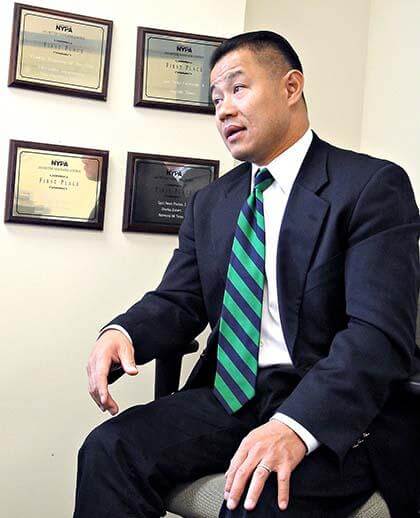By Howard Koplowitz
City Comptroller John Liu, one of the harshest and most public critics of the MTA, slammed outgoing MTA Chairman Jay Walder for not following through on his six-year commitment to the post.
Walder announced last month — after only 21 months on the job — that he was resigning from the Metropolitan Transportation Authority in October to take a job with the MTR Corp., which owns and runs Hong Kong’s mass transit system.
“I’m very disappointed that Walder’s leaving and I hold him responsible,” Liu said during an interview last Thursday at TimesLedger Newspapers’ Bayside offices. “He basically just threw his hands up and waved the white flag. I think it was a cop-out.”
Faced with a ballooning deficit, Walder had to raise fares, eliminate the V and W subway lines, cut many bus routes around the city and consolidate a number of agencies operating within the MTA.
Liu, who chaired the City Council Transportation Committee before being elected comptroller, said he believes the long-term solution to getting the MTA to be more financially sound involves the federal government.
The comptroller said there needs to be a change in the federal transportation formula, which is tilted toward highway construction, because there is not enough emphasis on mass transit.
The MTA, known for its fiscal woes, is $31.6 million in debt, according to its latest financial statement.
As the sole trustee of the city’s pension funds, Liu said the rising costs of pensions are “through the roof” but his office recently completed a study that found costs will decline in 2016 instead of continuing a steep increase that Mayor Michael Bloomberg has maintained.
Liu said the reason for the decrease is lower benefit amounts for new city employees.
“That increase is starting to level off now,” he said. Pension reform “should not be based on rhetoric or unfound characterizations of an ever-increasing pension cost. It should be based on informed discussion based on facts and research.”
The comptroller said the biggest factor in the rising costs of pensions is that the city’s investments have had their worst market performance in the last 10 years — going from consistent double-digit returns before then to single-digit returns during the last 10 years.
On pension reform, Liu said cutting back on pensions for city employees hired before the newcomers was out of the question.
Liu said the costs of the city hiring outside consultants is another budget problem, including contracts that are paid based on the time a contractor spends on a project, which he said gives them an incentive not to complete the project on time and falsify timesheets.
Reach reporter Howard Koplowitz by e-mail at hkoplowitz@cnglocal.com or by phone at 718-260-4573.



































